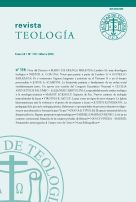Por favor, use este identificador para citar o enlazar este ítem:
https://repositorio.uca.edu.ar/handle/123456789/7423| Campo DC | Valor | Lengua/Idioma |
|---|---|---|
| dc.contributor.author | Scampini, Jorge Alejandro | es |
| dc.coverage.spatial | ARGENTINA | es |
| dc.date.accessioned | 2019-06-20T00:12:27Z | - |
| dc.date.available | 2019-06-20T00:12:27Z | - |
| dc.date.issued | 2016 | - |
| dc.identifier.citation | SCAMPINI, Jorge A., La Eucaristía, primicia y fundamento de un orden social verdaderamente justo : un aporte con ocasión del Congreso Eucarístico Nacional [en línea]. Teología, 119 (2016). Disponible en: https://repositorio.uca.edu.ar/handle/123456789/7423 | es |
| dc.identifier.issn | 0328-1396 | - |
| dc.identifier.uri | https://repositorio.uca.edu.ar/handle/123456789/7423 | - |
| dc.description.abstract | Resumen: Con motivo de la celebración del Congreso Eucarístico Nacional, el autor propone volver a la inspiración original de esos congresos, poniendo de relieve la dimensión salvífica social de la Eucaristía de cara a los desafíos que presenta la realidad argentina. Uno de ellos es, sin duda, el establecimiento de un orden social más justo. Como aporte en vista de ese fin, el artículo intenta profundizar en la relación entre Eucaristía y justicia. Esto se hace en un desarrollo en cinco momentos: una clarificación de la noción de justicia, desde el punto de vista jurídico-filosófico y desde la perspectiva bíblica; una relectura de las fuentes bíblicas relativas al signo y al significado de la Eucaristía, donde se pone de manifiesto que ésta es el sacramentum caritatis; un momento especulativo que busca explicitar la relación entre caridad y justicia, y la relación de ésta con la Eucaristía; la verificación de esa interpretación en la praxis sacramental cristiana de los primeros siglos; y, por último, la recuperación de algunos textos claves del Magisterio de la Iglesia que han desarrollado el tema. Esto permite concluir que la Eucaristía señala de modo eminente lo que significa ser cristiano, razón por la cual su celebración exige una cierta conducta ética. La Eucaristía rememora así que en Cristo la justicia de Dios ha sido definitivamente realizada y un nuevo orden ha sido instaurado; ella manifiesta e incentiva a establecer una verdadera “contra-cultura” donde prevalezcan la justicia y la solidaridad; y es signo profético de la realización de los “cielos nuevos y la tierra nueva”. Por eso el significado de la leitourgia del Pueblo de Dios se verá verificado en la diakonía y la martyria. | es |
| dc.description.abstract | Abstract: On occasion of the celebration of a National Eucharistic Congress, the author proposes to return to the original inspiration of those congresses, highlighting the social salvific dimension of the Eucharist facing the challenges presented by the argentine reality. One of these challenges is undoubtedly the establishment of a more just social order. As a contribution to this purpose, the article attempts to analyze the relationship between Eucharist and justice. This is done in five stages: a clarification of the concept of justice from the juridical-philosophical point of view and from the biblical perspective; a rereading of the biblical sources related to the sign and the meaning of Eucharist, where appears clearly why Eucharist has been considered the sacramentum caritatis; a speculative moment that seeks to explain the relationship between charity and justice, and its relationship with Eucharist; a verification of that interpretation in the Christian sacramental praxis of the first centuries; and finally, the recovery of some key texts of the Magisterium of the Church that have developed the theme. This leads to the conclusion that Eucharist expresses in an eminent way what it means to be a Christian, and, as consequence, why its celebration requires a specific ethical conduct. The Eucharist recalls that in Christ God’s justice was finally realized and a new order has been established; it expresses and encourages to establish a true “counterculture” in which justice and solidarity prevail; and it is the prophetic sign of the realization of the “new heavens and new earth”. Because of this, the meaning of the leitourgia of the People of God should be verified in its diakonia and martyria. | es |
| dc.format | application/pdf | es |
| dc.language.iso | spa | es |
| dc.publisher | Universidad Católica Argentina. Facultad de Teología | es |
| dc.rights | Acceso Abierto | es |
| dc.rights.uri | https://creativecommons.org/licenses/by-nc-sa/4.0/ | es |
| dc.source | Teologia, 53(119), 2016 | es |
| dc.source | ISSN 0328-1396 | es |
| dc.subject | EUCARISTIA | es |
| dc.subject | JUSTICIA | es |
| dc.subject | CARIDAD | es |
| dc.subject | ETICA | es |
| dc.subject | MAGISTERIO DE LA IGLESIA | es |
| dc.subject | ORDEN SOCIAL | es |
| dc.title | La Eucaristía, primicia y fundamento de un orden social verdaderamente justo : un aporte con ocasión del Congreso Eucarístico Nacional | es |
| dc.title | Eucharist, the first fruit and the foundation of a social order really just : a contribution on occasion of the National Eucharistic Congress | es |
| dc.type | Artículo | es |
| uca.path | Teología|2016 Tomo LIII nº 119 | es |
| uca.disciplina | TEOLOGIA | es |
| uca.filename | /home/data-uca-generic/folder_revistas/Revistas varias/Teologia/119/eucaristia-primicia-orden-social/metadata.xml | es |
| uca.issnrd | 1 | es |
| uca.affiliation | Fil: Scampini, Jorge Alejandro. Sociedad Argentina de Teología; Argentina | es |
| uca.orden | 04 | es |
| uca.version | publishedVersion | es |
| item.fulltext | With Fulltext | - |
| item.languageiso639-1 | es | - |
| item.grantfulltext | open | - |
| Aparece en las colecciones: | TEO - 2016 Tomo LIII nro. 119 | |
Ficheros en este ítem:
| Fichero | Descripción | Tamaño | Formato | |
|---|---|---|---|---|
| eucaristia-primicia-orden-social.pdf | 387,48 kB | Adobe PDF |  Visualizar/Abrir |
Visualizaciones de página(s)
251
comprobado en 30-abr-2024
Descarga(s)
631
comprobado en 30-abr-2024
Google ScholarTM
Ver en Google Scholar
Este ítem está sujeto a una Licencia Creative Commons

